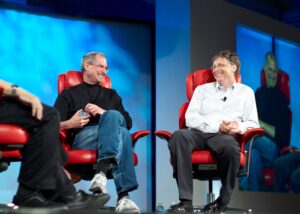By Brett Peruzzi, Managing Editor

REGION – If you were born between 1954 and 1965, you have probably thought of yourself generationally as a Baby Boomer, albeit a late one.
But consider this moniker to describe your age group―Generation Jones.
Where it came from
The term was created over 20 years ago by Jonathan Pontell, a television producer, director, and writer, who later published a book with the same name. His premise was that the roughly decade-long cohort of late Boomers didn’t have many of the shared coming-of-age experiences of the early Boomers, born from 1946 to 1953.
Why the name Generation Jones? It has multiple meanings―the sense of being part of an anonymous generation wedged between the Baby Boomers and Generation X, the sense of competitiveness with peers, dubbed “keeping up with the Joneses,” and also that the slang term “jones” from drug culture, meaning a craving or yearning. “Jonesers” according to Pontell, were infused with optimism from their childhood in the 1960s.
They became more cynical in the 1970s however because of events like Watergate and President Nixon’s resignation and the economic woes caused by the oil crisis and stagflation. They entered the workforce as the most highly educated generation in American history. But there was high unemployment due to multiple recessions and manufacturing was on the decline as the country moved to a service economy. Record-high mortgage rates of up to 16 percent made buying a home more difficult. Combined with stagnating wages and the shrinking availability of jobs that offered pensions increased the feeling of Jonesers that they had missed the prosperity the older Boomers had.
Famous members
In 2008, arguably the most famous member of Generation Jones entered the world stage: President Barack Obama, born in 1961. He remains the only member of the generation to hold the office.
“I identify with this generation between the Baby Boomers and Generation X,” Obama has said. “My mother was a Baby Boomer, and I’m part of Generation Jones.” Other famous Jonesers include technology titans Bill Gates and Steve Jobs. Most of the musicians and fans that formed the late 1970s and early 1980s punk and new wave scenes are Jonesers, including Johnny Rotten of the Sex Pistols, Mick Jones of The Clash, and Elvis Costello, no surprise given the cynical outlook the generation inherited.
Boston professor celebrates Generation Jones

Photo/Submitted
But most of the 53 million members of Generation Jones are just ordinary people, of course. Like David Yamada, a law professor at Suffolk University in Boston, and author of a blog called Musings of a Gen Joneser. Some of Yamada’s blog posts have a lot of fun with the pop culture of Generation Jones, such as “75 Reasons You May Be a Gen Joneser”, which covers everything from TV shows like “Gilligan’s Island” and “The Flintstones” to movies like “Jaws” and “Animal House” to technology like rotary dial phones and electric typewriters.
“For many years I had informally called my age cohort the ’tweener generation,’ referring to folks who didn’t quite fit into the Boomer or the Gen X modes,” said Yamada. “When I discovered the Generation Jones label, I realized that I wasn’t imagining this distinction.”
Yamada started writing a professional blog in 2008, but several years later he wanted to also write a personal one. “When I thought about how to package it, the Generation Jones theme appealed to my sense of time and history and penchant for nostalgia,” he explained.
“I used to lament missing out on the heart of the Sixties―the activism, the music, the whole drama and tumult of that time,” said Yamada. “Today, however, I’m much more accepting of, even grateful for, the paths that have been made available to me. Furthermore, as a creature of nostalgia, I’m aware of how the world can look better through the rear-view window,” he continued. “In contrast to classic Boomers, for example, my high school class didn’t have to face the possibility of being drafted and sent off to fight in Vietnam.”
Economic and political shifts
But Gen Jonesers faced some economic challenges, Yamada reiterated, that the earlier Boomers did not, at least to the same degree. “As a group, many of us came along a little too late to access affordable housing markets in popular cities, employer-provided pensions, a friendly blue-collar job market in manufacturing and industry, and dirt-cheap university tuition,” he noted. “In that sense, we faced the beginning of challenging economic shifts that succeeding generations are confronting in even harsher terms.”
There was a political shift that also colored the perspective of many Jonesers as well, Yamada believes. “The somewhat decade book-ending events of Watergate and the Reagan election helped to shape my political outlooks,” he noted. “Internationally, we were approaching the last decade of the Cold War and the emergence of the Middle East as a global hotspot.”
So, has Generation Jones as a label been embraced by many younger Boomers? “I don’t think that ‘Generation Jones’ has quite caught on in a mainstream way,” said Yamada. “However, when folks in this age cohort hear about the label, it often resonates with them. Just a little explanation and they get it quickly.”
RELATED CONTENT:
When President Bill Clinton Came to Framingham – Fifty Plus Advocate
‘Leave things better for others’ says former governor Deval Patrick (fiftyplusadvocate.com)
Civil rights activist works to instill justice values in younger generations – Fifty Plus Advocate












